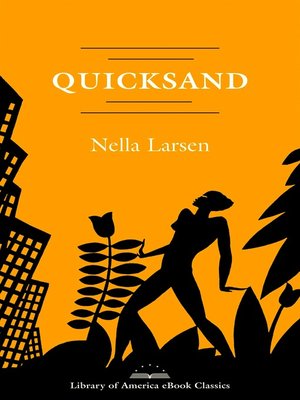
Sign up to save your library
With an OverDrive account, you can save your favorite libraries for at-a-glance information about availability. Find out more about OverDrive accounts.
Find this title in Libby, the library reading app by OverDrive.



Search for a digital library with this title
Title found at these libraries:
| Library Name | Distance |
|---|---|
| Loading... |
Library of America presents one of the masterworks of the Harlem Renaissance, the tragic story of a young woman caught between worlds.
Quicksand (1928) turns the techniques of literary naturalism on questions of race, gender, and class, with unforgettable results. Nella Larsen’s immensely stylish debut novel tells the story of sensitive, proud, and beautiful Helga Crane, the daughter (like Larsen herself) of a black West Indian father and a white Danish mother. She has what some would consider a promising career in the South, teaching at “the finest school for Negroes anywhere in the country,” and a respectable fiancé. But she refuses to settle for the loveless future she envisions, hemmed in by petty conformities and the realities of southern racism, black as well as white––and so she sets off in search a happier life, a journey recounted with great feeling and psychological precision in Quicksand. In Chicago, white in-laws disown Helga. Other relatives, in Copenhagen, fête her as a gorgeous exotic, and arrange a relationship with a famous Danish artist, but fail to see her as anything other than a marriageable commodity. Only in cosmopolitan New York, encountering what Larsen describes as “the continuously gorgeous panorama of Harlem,” does she begin to sense that she may have found a place where she might belong. But hers is a fate full of ambivalence, in which even the faith and family to which she turns are forms of entrapment.
Quicksand (1928) turns the techniques of literary naturalism on questions of race, gender, and class, with unforgettable results. Nella Larsen’s immensely stylish debut novel tells the story of sensitive, proud, and beautiful Helga Crane, the daughter (like Larsen herself) of a black West Indian father and a white Danish mother. She has what some would consider a promising career in the South, teaching at “the finest school for Negroes anywhere in the country,” and a respectable fiancé. But she refuses to settle for the loveless future she envisions, hemmed in by petty conformities and the realities of southern racism, black as well as white––and so she sets off in search a happier life, a journey recounted with great feeling and psychological precision in Quicksand. In Chicago, white in-laws disown Helga. Other relatives, in Copenhagen, fête her as a gorgeous exotic, and arrange a relationship with a famous Danish artist, but fail to see her as anything other than a marriageable commodity. Only in cosmopolitan New York, encountering what Larsen describes as “the continuously gorgeous panorama of Harlem,” does she begin to sense that she may have found a place where she might belong. But hers is a fate full of ambivalence, in which even the faith and family to which she turns are forms of entrapment.







